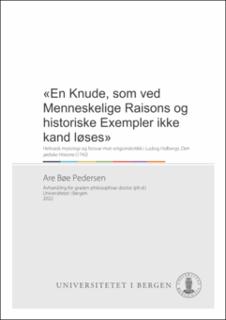| dc.description.abstract | Should some works simply be consigned to the dustbin of history – or can insights be gleaned, centuries later, even from unfavorably received publications? This dissertation examines Danish-Norwegian Enlightenment writer Ludvig Holberg’s (1684-1754) work Jewish History (1742, Danish: Den jødiske Historie). Jewish History has been criticized for its historical method, for its reliance on a few primary sources, and – perhaps most damningly – for being irredeemably dull. The former two are certainly true. The latter, while perhaps a matter of interpretation, is hardly an unreasonable charge.
Jewish History’s 1300 pages of dense writing spans the history of the Jews from Genesis until Holberg’s immediate past. Much of the material is translated and compiled from Classical, English, and French sources, such as Flavius Josephus, George Sale, Humphrey Prideaux, and Jacques Basnage. While Holberg’s desire to write a comprehensive history of the Jews can be partly explained by Jews emerging as a visible demographic in Copenhagen during the first half of the 18th century, the work’s context also encompasses that of an early Enlightenment religious struggle. I argue that the work is defined by a previously overlooked pattern: Holberg’s interjected ruminations on the various described in his Jewish History, together constitute an ardent defense of the continued role of Revelation within the (Protestant) Christian faith. Furthermore, I argue that this forms a coherent response to the two broad movements of Biblical and religious criticism that emerged from the 1680s and onwards. The brunt of Holberg’s criticism is aimed at the central tenets of Deism, as expressed by figures such as Matthew Tindal (1657–1733). Deism emphasized the role of Natural religion over Revealed religion, arguing that the latter was essentially obsolete. This notion was simultaneously intertwined with rationalist and historicist critiques of The Old Testament, which Holberg also seek to dispel.
Employing a framework based principally on Paul Ricoeur’s theory of historical time as the mediating agent between human and cosmological time as presented in Temps et Récit (1983-85, eng. Time and Narrative, 1984-88), I argue that a central question of the debate in which Jewish History takes part, is whether the Sacred History of the Old Testament should be considered historical or mythological. The stakes inherent in this question – myth or history? – becomes evident upon considering Holberg’s view of Classical myth: Mirroring the views of thinkers such as his inspiration and interlocutor, Pierre Bayle (1647–1706), Classical myth is perceived as not only ahistorical, but as a collection of poorly-conceived moral fables that serve little purpose for an Enlightened society. Faced with the possibility of a continued erosion of the Bible’s historicity, that could potentially see Sacred History reduced to mere «Hebrew mythology», Holberg employs a range of rhetorical devices throughout Jewish History to maintain the essential and literal historicity of the Bible.
This dissertation concentrates on a selection of passages from Jewish History, determined by the degree to which Holberg offers his own commentary on the events he presents to the reader. This commentary centers on contentious, scriptural passages, thus serving a dual purpose: It functions as a road map to textual controversies and in turn shape the parts of the compilation where Holberg’s authorial voice is the most pronounced. Close readings include Holberg’s retelling of the Primeval Cycle, parts of the Mosaic history of the patriarchs, his retelling of the Book of Judges, and finally a selection of what I suggest constitute examples of historiographical myth-making firmly within historical time. The use of history as a venue for participating in the learned debate on the nature of religion illustrates another, rarely emphasized aspect of Jewish History: Its title belies a distinctly Christian perspective on history, Jews, and Judaism alike. Similarly to its 17th century antecedents in Christian Hebraism, Jewish History employs the perspective of a Christian «onlooker», charting the history of the Jews first and foremost as it relates to Christianity, guided by Biblical typology and Divine providence. | en_US |
